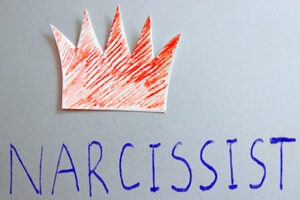
Despite their grandiose and attention seeking nature, it can be quite hard to determine if someone is a narcissist, especially if you’re engaged in a close relationship with them. It’s in our nature to give the benefit of the doubt and be accepting of people’s flaws. After all, none of us are perfect. So we shrug off unpleasant episodes with the attitude of, ‘well, that’s just the way they are…’
In the initial stages, the negative traits of a narcissist might not be on full display. They’ll appear charming at first, testing the limits of what they can and can’t get away with, as they push your boundaries with increasing demands. There is a sense of strategy to the way they operate, as the more comfortable they feel with you, the more emboldened they become. In a sense, the familiarity breeds contempt.
If you’re unsure of what kind of behaviour constitutes as narcissistic abuse, the following is a list that breaks down the most prevalent traits.
Criticism – The most commonly experienced sign of narcissistic abuse, but not necessarily the most obvious, given how prone we are as a society to casual judgment. It can take a while for the patterns to form. This is especially true at the outset of a relationship, as criticism might register as subtle corrections and the occasional passive aggression remark. But over time, these comments cross the line from being easily brushed off to harsher put-downs.
The intent is always to maintain some element of control, whether it’s to have you to put more effort into fulfiling their needs, or prevent you from acting, independently. By the time the dynamic has reached this stage, it’s likely you’ll be feeling as though nothing you can do is good enough, as the mental and emotional toll bears down on you. Another form of criticism is known as ‘projection.’ You’ll find this mostly at play in arguments, as your abuser tries to attribute their own faults to you, a key facet of triangulation. (See below)
Isolation & the ‘me show’ – Everything a narcissist does is intended to weaken and isolate you from as many of your external commitments as they can. Their agenda is for you to serve them and only them. It is possessiveness and entitlement taken to its extremities, because as far as they’re concerned, you’re theirs; your sole obligation is to fulfil their needs. You’ll find your partner become intensely jealous whenever you try to act independently, especially if it includes people they view as a ‘threat’ to their ownership of you.
They’ll use criticism, triangulation (see below) and other manipulative techniques, in the form of ‘punishments,’ – emotional blackmail – unless you conform. The longer this continues, the more it will seem as though every conversation has become a battle of wills, as you feel you always have to justify your actions. It can result in you resigning yourself to giving up on the things and people you love just for the sake of a peaceful life, which is precisely what the narcissist wants.
Loved and Loathed – Does the person in your life flip from lavishing you with praise one minute, only to treat you with disdain the next? It can be quite a jarring experience, and one of the first real warnings you may, in fact, be dealing with a narcissist. However, it can also lead to confusion, with those negative streaks being written off as just a bad day, or thoughts of, ‘they mustn’t have liked it when I did that…’
It’s natural to want to see the good in people and rationalise, but if this kind of behaviour persists, you need to consider whether this is actually their true character showing and not just a series of mood swings. When they’re trying to achieve their goals, a narcissist will appear almost beyond reproach, showering you with constant praise and affection. It’s a tactic called ‘love bombing.’ However, once you’ve given them what they want, or you’ve rebuffed their charm offensive, their good nature is replaced with indifference; even anger.
Reduced Feelings of Wellness – The turbulent nature of being in a relationship with a narcissist can exact a physical as well as a mental and emotional toll. In holistic terms, our health is comprised of physical, mental, emotional and spiritual aspects of self, which, if one is out of balance, or ‘dis-eased,’ it can lead to symptoms manifesting in other parts of our being. This is the principle behind psychosomatic – sometimes simply called somatic – conditions, which can be present in cases of severe and prolonged narcissistic abuse.
If you’re in a constant state of lethargy, it could be possible you’re suffering from adrenal burnout, as a result of the stress of your relationship. Fibromyalgia is another well-documented symptom, along with the more expected issues of depression, anxiety and disrupted sleep patterns. If you’ve been faced with any of the challenges mentioned within this list, and also find yourself dealing with these additional symptoms, it may be time ask whether your relationship is serving you.
Loss of Identity – This will only become apparent after spending an extended period with a narcissist and is the result of them directing so much criticism, isolating you to such extent, you lose your sense of self. If you’ve found yourself having to make endless compromises in your relationship, it invariably leads to self-censorship and a lack of confidence. Little by little, you dissociate with who you are, becoming emotionally numb as a survival mechanism. You follow the path of least resistance.
In effect, the dynamic could be likened to one of parasite and host, as the narcissist consciously and systematically drains you of your life force. To be the victim of this kind of treatment is no trivial matter; it can be damaging in the extreme, sometimes taking years to recover from. When the loss of identity has taken place, it can lead to profound states of depression, anxiety and PTSD (Post Traumatic Stress Disorder) and in the worst cases, even suicide when there has been no intervention.
Triangulation – This is the most manipulative and deceitful of all tactics. As the name suggests, triangulation involves bringing in a third party with the purpose of either winning an argument or creating competition between those involved to gain more attention. There are three roles within this dynamic, the oppressor (narcissist), the champion (the third party) and the persecuted (the victim). However, it isn’t uncommon for the champion and victim to play both roles simultaneously, being played off against one another.
The classic example is of the ‘oppressor,’ who, in the belief they’re a ‘victim,’ project their negative qualities onto their partner, the ‘persecuted’. In turn, this triggers counterclaims, which the narcissist will refute, leading to the introduction of their ‘champion.’ This could be either a person or a statement, real or fictionalised that back up their arguments. The result is the ‘persecuted’ rightfully defending themselves, shifting the blame back onto the narcissist. This, can, in fact, worsen their position though, as their behaviour is then used as proof of the original claims against them. It can be a vicious cycle and result in the break-up of entire social and support networks, isolating you even further.
***If you suspect you’re suffering at the hands of narcissistic abuse, and are unsure of how to approach the situation, one of our specialists would happy to provide you will an initial consultation to determine how best to assist you.
You may also want to read more about Narcissistic personality disorder.

















